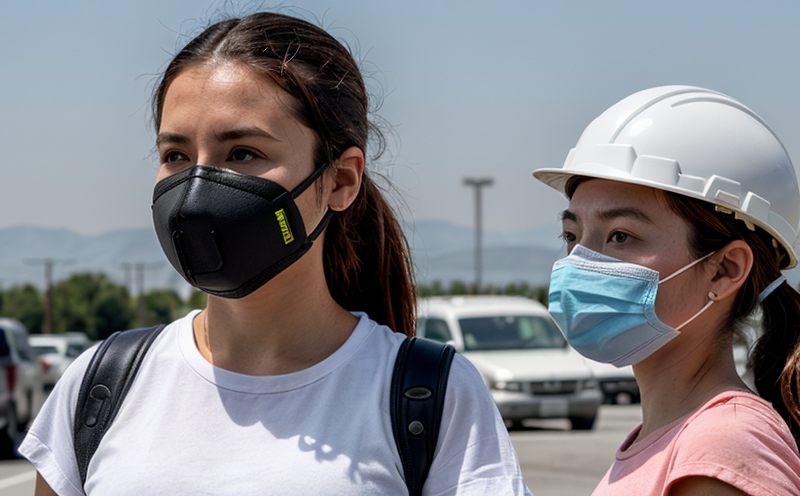ISO 11095 Total Suspended Particulate Matter TSP Test
The ISO 11095 Total Suspended Particulate Matter (TSP) test is a critical procedure used to assess the concentration of particles in ambient air, which is essential for monitoring and managing environmental quality. This test provides comprehensive data on particulates that can range from coarse dust to fine aerosols, depending on their aerodynamic diameter.
Total Suspended Particulate Matter (TSP) testing plays a pivotal role in various sectors such as construction, manufacturing, mining, and urban planning. It is particularly important for industries subject to stringent environmental regulations aimed at reducing air pollution and safeguarding public health. The test helps regulatory bodies, quality managers, and compliance officers ensure that the levels of particulate matter do not exceed permissible limits set by international standards like ISO 11095.
Conducted in accordance with ISO 11095, this method involves the collection of air samples over a specified period using an appropriate sampling device. The collected particles are then analyzed to determine their mass concentration per cubic meter of air. This data is crucial for identifying potential sources of pollution and assessing the effectiveness of mitigation measures.
Understanding the significance of particulate matter in ambient air requires knowledge of its impact on human health, ecosystem balance, and climate change. Fine particulates (PM2.5) can penetrate deep into lung tissue causing respiratory issues, while larger particles contribute to visibility impairment and deposition onto surfaces leading to accelerated corrosion.
The ISO 11095 standard ensures consistent testing procedures across different regions by specifying sampling methods, equipment requirements, sample preparation techniques, analysis protocols, and reporting formats. Adherence to this international guideline enhances comparability of results among laboratories worldwide, facilitating more accurate evaluations of air quality trends over time.
At our laboratory, we employ state-of-the-art instruments calibrated according to ISO 11095 guidelines to perform TSP tests efficiently and accurately. Our experienced technicians follow strict protocols throughout the entire process from sample collection through final analysis. This ensures reliable measurements that meet or exceed regulatory requirements.
Scope and Methodology
| Aspect | Description |
|---|---|
| Sampling Devices | We use NIOSH filter cassettes for sampling TSP, which are capable of capturing particles down to 0.3 microns. |
| Sampling Periods | The standard recommends a minimum of eight hours of continuous sampling at each site location. |
| Analytical Techniques | Gravimetric analysis is performed using precision balances to measure the mass of collected particulates accurately. |
| Data Interpretation | The resulting weight values are converted into concentrations based on volume of air sampled, providing insights into pollutant levels. |
The ISO 11095 protocol ensures that all aspects of the TSP test follow stringent procedures to produce reliable and repeatable results. By adhering strictly to these guidelines, our laboratory guarantees accurate assessments of air quality compliance with global standards.
Benefits
The ISO 11095 Total Suspended Particulate Matter TSP test offers numerous advantages for organizations and individuals involved in environmental monitoring. Here are some key benefits:
Compliance Assurance: Ensures adherence to international standards, helping companies avoid penalties associated with non-compliance.
Health Protection: Provides essential data on particulate concentrations that can inform public health policies and interventions.
Pollution Mitigation: Identifies sources of pollution allowing for targeted strategies aimed at reducing emissions effectively.
Beyond these direct benefits, TSP testing also supports broader environmental initiatives by fostering awareness about air quality issues. It encourages proactive measures to improve sustainability practices within industries and communities alike.
Competitive Advantage and Market Impact
Precise Measurements: Utilizing cutting-edge technology ensures accurate measurement of TSP levels, giving clients confidence in the reliability of our reports.
Global Recognition: Our adherence to ISO 11095 means that results are accepted worldwide, enhancing our reputation and market share.
Comprehensive Reporting: Providing detailed insights into particulate composition helps stakeholders make informed decisions regarding pollution control efforts.
Innovative Solutions: By staying ahead of regulatory changes through continuous improvement initiatives, we offer solutions tailored specifically to evolving needs in environmental testing.
The combination of these factors gives us a competitive edge over competitors who may not adhere as closely to international standards or possess similar analytical capabilities. Our commitment to excellence translates into higher customer satisfaction levels and long-term business relationships built on trust and reliability.





